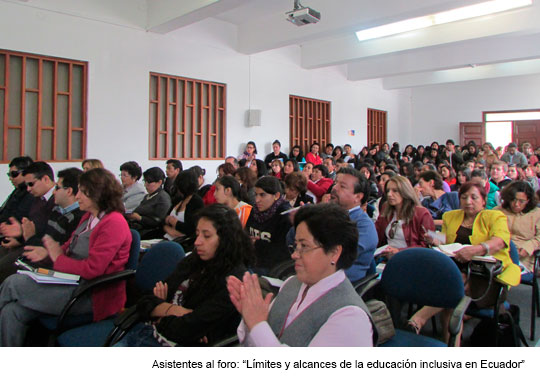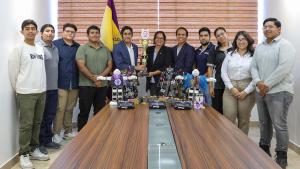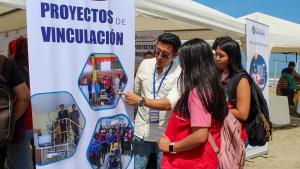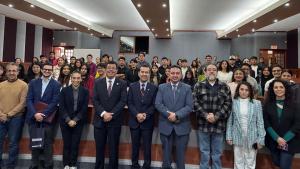QUITO: Se analizaron los límites y alcances de la educación inclusiva en Ecuador
QUITO: Se analizaron los límites y alcances de la educación inclusiva en Ecuador

On Wednesday April 14th the forum titled "Limits and achievements of inclusive education in Ecuador" was held in Quito as part of the activities of the Global Campaign for Education. There was a debate about the concept, practice, public policies, and challenges that exist regarding inclusive education in Ecuador
The speakers were Edison Romo, Vice Minister of the Social Development Ministry, Miriam Gallegos, Director of the Special Education Master's program at UPS, Milton Luna Tamayo, National Coordinator of Contrato Social por la Educacion, and Mario Mora, representative of CBM International. People with visual impairment, and students and teachers from Social Communication, Pedagogy and Psychology attended this forum; there were about 150 people in all.
Three participants expressed their ideas and the challenges of inclusive education from their own experience, they considered these challenges to be crucial for the country. Luna Tamayo welcomed the attendees and explained that the Global Campaign for Education has been held for 10 years in more than 120 countries. Mario Mora form CBM International was the mediator for this forum.
Adaite Vargas, mother of a little girl with Angelman syndrome; Elizabeth Chicaiza, a visually impaired Social Communication student; and Nancy Merino, mother of a student with hearing impairment shared their opinions about the reality of inclusive education in Ecuador.
The Vice Minister of the Social Development Ministry addressed this issue from the legal and constitutional context. He pointed out that the objectives of the Plan Nacional del Buen Vivir or the National Plan for Good Living are to have social inclusion and equality. He said that the government works on inclusion and integration, and that it considers inclusion as the transformation of education systems, adapting to the needs of diversity according to the adjustments that have to be made in education systems; and integration in terms of how to incorporate people with disabilities to regualr education.
Gallegos, Director of the Special Education Master's program at UPS, said that "if measures are not taken in the entire education system, education of people with disabilities will not be a reality".





Follow us
Follow us